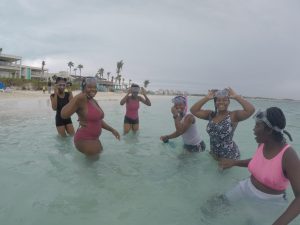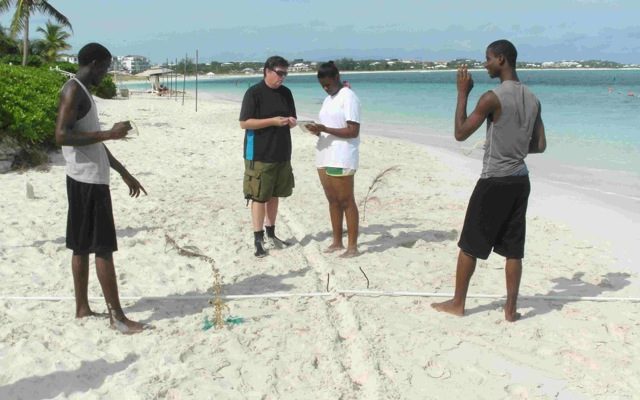Tropical Marine Biology Class
The Tropical Marine Biology Class taught by Dr. Karen Cangialosi at Keene State College, allows undergraduate students the opportunity to investigate topics such as tropical marine ecology, biodiversity, coral reef biology, conservation, and environmental issues. The course incorporates a rich field trip experience to the Turks and Caicos Islands where students get direct hands-on experience diving and snorkeling to observe marine life. Students also learn the methods of reef monitoring and learn much about the local culture of the islands. Tropical Marine Biology students continue to play an important role as instructors in the September Reef Education Program.
Beyond the Classroom by Jaime Marsh
Picture this: you sign up for a class, on the first day you take a seat in a generic, over-sized lecture hall alongside 20 other classmates, you open your textbook to the first chapter, the professor walks in and shortly begins lecture. With the exception of a few monotonous exams, this is how the next 15 weeks of the semester will be. This is how the majority of classrooms have operated throughout our middle school, high school, and college years. For many of us, we do not know any differently, however a new wave of an open education based curriculum is slowly approaching that is very quickly changing the way we learn.
For me, it started in a Tropical Marine Biology course I enrolled in, in my junior year at Keene State College. We began the first day of class in the most non-traditional way possible, by being asked one simple question: ‘what do you all want to do this semester?’ While we still had some traditional components to the course like lectures, it rapidly evolved into something much larger- from something we learned, to something we could apply, to something we created, to something that I love. While the series of identification quizzes at the start of the semester provided me a solid base to apply my knowledge of certain species and marine ecosystems, they did not prepare me for the depth and wealth of my actual experiences on the May 2017 trip. For many reasons, this trip to the Turks and Caicos Islands forever changed me.
First and foremost, it provided me the opportunity to return to TCI in September 2018 to participate in the Coral Reef Monitoring and Youth Education Program under the direction of Dr. Karen Cangialosi and Dr. Scott Strong (read more about this below).
Once there, my classmate Alana and I assisted in the collection of data for the Reef Check International database, as well as helped run a small after-school snorkeling program for a few of the local high school girls. With my first trip to TCI under my belt, I was confident and excited to not only share my knowledge of the coral reef system, but to also share my passion for the ocean and all of its’ wonders. However, to say it was a humbling experience would be an understatement. Dr. Cangialosi had previously stated that many of the Turks Islanders do not know how to swim, and in fact, many have never even been in the ocean because they are scared of it or have been discouraged from swimming. When we asked the girls if any of them knew how to swim, most of them timidly answered ‘yes,’ however once in the water, their lack of experience was evident. For the first few days we focused largely on teaching the girls not only how to swim and float, but also teaching them the basics of the coral reef system and species identification. The majority of the time they clung to us; my hand had never been so numb. Several times I was pulled underwater, or hit in the face by flailing arms and flippers, all while treading water for over an hour. Over the course of a week we watched them become more comfortable, not just with the ocean and the water, but also with themselves. They slowly let go of our hands, and before you know it heads were popping up out of the water yelling to us in pure excitement that they had just seen a Queen Parrotfish, a Spotted Eagleray, or their favorite-a Sea Turtle. It was incredibly rewarding to see these girls begin to excel so quickly at something they were at first so afraid of.
I felt that our time with this group of girls went beyond what we originally set out to do. The goal was to teach them how to snorkel and give them information regarding the coral reefs; but within this short period of time, the moments that mattered the most were the small victories that each girl accomplished. One girl floated for the first time all by herself, another swam for 50 meters without stopping, and all of them were identifying the different species that comprise the coral reef system. We also listened to their hopes and dreams, their plans after high school, and encouraged them to go to university. I would like to think that we instilled them with confidence to go forth in life and follow any dreams big or small. And while I would love for any of them to continue to snorkel and identify the different species, and even share their knowledge with others, I do not believe that this was the biggest take away. They learned to not only trust themselves, but to trust a complete stranger, to be independent but to lean on others when you need to, and most importantly I think they learned how to believe in themselves when faced with a challenge.

That being said, it would be naïve of me to say that they did not have a similar impact on me because while this experience was humbling, it was also rewarding. The number one lesson I learned was that there are just some things that you can’t learn in a classroom. Yes, in the classroom I learned how to identify at least a hundred different types of marine life, but now knowing that I can actually apply it outside in the real world puts many things into perspective. To begin with, a classroom can’t teach you that everyone comes from a different background, and it is likely different than what we see on the surface or what we imagine. A classroom can’t teach you that it’s important to find the joy and happiness in all moments, no matter how big, small, sad, or happy they may be. A classroom can’t teach you what you love, just so you can do it, you have to experience it-whether it is medicine, marine biology, teaching, or all of the above. A classroom can’t teach you that it is alright to go down a path to find out it’s not where you want to be-sometimes you just have to travel down it. Some lessons are meant to be learned outside of the classroom, even if it happens to be in the middle of the ocean, 60 meters underwater. In the famous words of Jacques Cousteau, “The sea, once it casts its spell, holds one in its net of wonder forever.”
Field Trip May 2017
See some of the reflections on a field trip to Providenciales in the Turks and Caicos Islands from May 9 to May 19, 2017.
Coral Reef Monitoring, Youth Education in the Turks and Caicos Islands

Photo by Scott Strong (copyright, use with permission)
In 2008, Dr. Karen Cangialosi and Dr. Scott Strong, established a coral reef monitoring program off the shores of Providenciales, in the Turks and Caicos Islands (TCI). On an annual basis habitat quality, measures of the physical environment, and invertebrate and fish diversity along a linear 100M transect on a small patch reef in Grace Bay are collected for data using the protocols of Reefcheck International. Each year the data is submitted to the Reefcheck International database, an Open Dataset available to the public. The data that is collected is also submitted to and used locally by the TCI Department of Environmental and Maritime Affairs. Over the years, they have established strong relationships with many individuals on Provo including business owners/operators, government officials, teachers, and school administrators. Dr. Karen Cangialosi serves as the Reef Check Team Coordinator for the Turks and Caicos Islands.
Integral to this project, they also run a small-scale Reef Education Program (REP) with resident students affiliated with the Gartland Youth Centre on Providenciales (Provo). This program is designed to help youth develop an understanding of the marine environment and emphasizes that sustainable practices can ensure not just the health of TCI’s reefs, but lead to healthier and more equitable living for its people. REP participants (14 to 17-yr-olds) are recruited primarily from Clement Howell High School, which has approximately 350 students including local Turks Islanders (Belongers), and expatriates primarily from Haiti, Jamaica, and the Dominican Republic. Participants learn snorkeling, marine life identification, behavior, diversity, and ecology of coral reefs, while also focusing on issues central to reef conservation. This program has been very successful in contributing to increased environmental awareness, internships, jobs, university admission and other opportunities for our Turks Islander REP participants.
Modified slightly from “Coral Reef Monitoring, Youth Education in the Turks and Caicos Islands” by Karen Cangialosi.
“Tropical Marine Biology Class and Field Trip May 2017” by Audrey Boraski and Haley Zanga
“Beyond the Classroom” By Jaime Marsh
